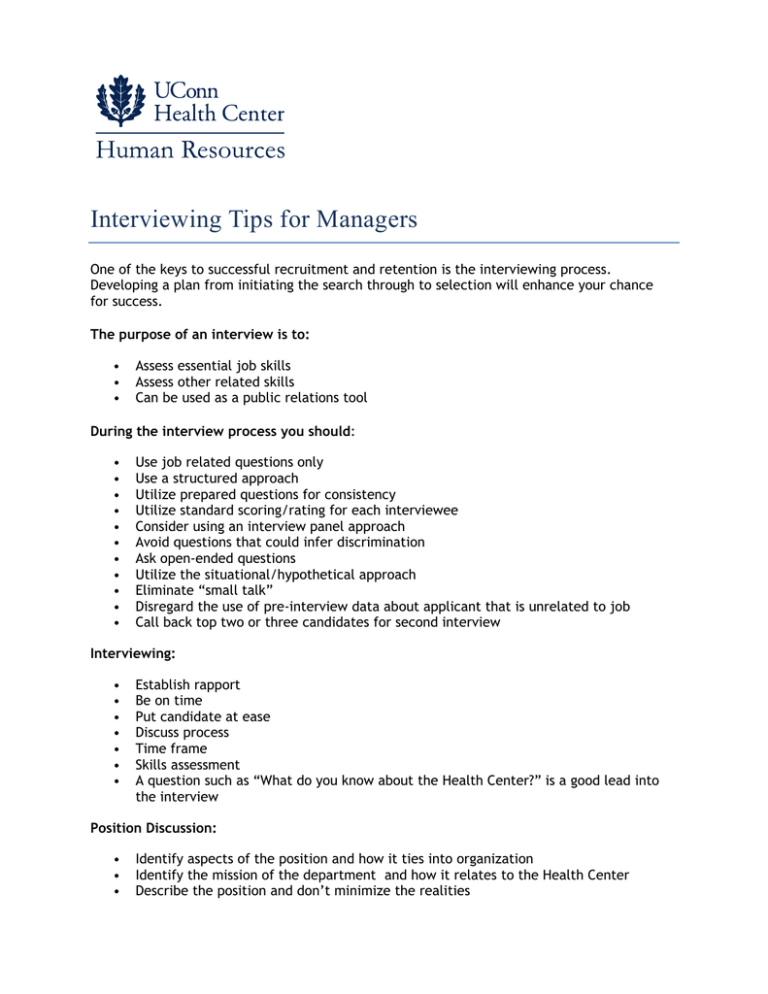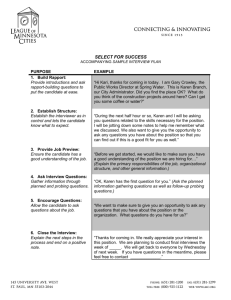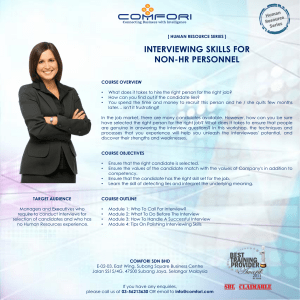Interviewing Tips for Managers
advertisement

Interviewing Tips for Managers One of the keys to successful recruitment and retention is the interviewing process. Developing a plan from initiating the search through to selection will enhance your chance for success. The purpose of an interview is to: • • • Assess essential job skills Assess other related skills Can be used as a public relations tool During the interview process you should: • • • • • • • • • • • Use job related questions only Use a structured approach Utilize prepared questions for consistency Utilize standard scoring/rating for each interviewee Consider using an interview panel approach Avoid questions that could infer discrimination Ask open-ended questions Utilize the situational/hypothetical approach Eliminate “small talk” Disregard the use of pre-interview data about applicant that is unrelated to job Call back top two or three candidates for second interview Interviewing: • • • • • • • Establish rapport Be on time Put candidate at ease Discuss process Time frame Skills assessment A question such as “What do you know about the Health Center?” is a good lead into the interview Position Discussion: • • • Identify aspects of the position and how it ties into organization Identify the mission of the department and how it relates to the Health Center Describe the position and don’t minimize the realities Obtain information from candidate: • • • • • • Use an evaluation tool such as a weighted scale and take notes Ask “How do you feel your experience makes you the choice applicant for this position?” Encourage the applicant to do most of the talking (80/20 rule) Ask the same questions of all applicants for consistency Avoid asking questions pertaining to: age, race or ethnicity, candidate’s ancestry, birth place, native language, religion, religious customs or holidays, sex or gender, pregnancy or medical history, family or marital status, childcare arrangements, physical or mental disabilities Be careful what you ask – remember that asking the wrong questions could be a potential liability for the Health Center Concluding the Interview: • • • Give applicant a chance to add anything or ask any addition questions Outline the next steps (second interview, for example) Always end on a positive note to promote public relations Evaluation and Documentation: • • • • Review/score responses Value all opinions – facilitates successful selection and reduces liability Document/rate/recommend Consult Human Resources Officer or Recruitment Specialist with any questions or concerns When Interviewing Persons with Disabilities: DO • Ensure that the interview facility is accessible to people with disabilities • Inform the applicant of any special parking available • Allow the applicant at least a full day to prepare for your interview • Identify the essential functions of the job • Make eye contact with the person. Talk directly to the person with the disability – not to an interpreter • After the initial greeting, sit down so that a person who uses a wheelchair can easily make eye contact DON’T: • Assume the person is able to shake your hand in greeting • Lean on an applicant’s wheelchair • Shout or raise your voice to a person who is hearing impaired • Touch or talk to a seeing-eyed dog • Ask about a person’s disability history • Ask about prior workers’ compensation claims • Ask how the person became disabled • Ask how a person is going to get to work Interviewing Tips for Managers Page|2 Final Interview Reminders: • It is essential to know your state and local discrimination laws because some individuals may be in a “protected class” even if they are not in a federally protected class (sexual orientation is a good example) • The interviewer should stay focused on the job and its requirements, not any preconceived assumptions about what the applicant can or cannot do • Sell the job and the Health Center while keeping your pitch realistic. Unrealistic job expectations will generally lead to employee dissatisfaction and higher turnover • Make sure you elicit questions or provide information which will help clear up any unanswered questions or doubts that are lingering in the applicant’s mind • End the interview on a friendly note and, if possible, apprise the candidate of the next step and the time frame for a decision • Complete the candidate evaluation form while the interview is still fresh in your mind • Make a fair and unbiased recommendation or decision based on the job-related qualifications of the applicants Please remember to keep your Human Resource Officer an active part of the process. She/he is available to assist you in the development of an evaluation scale and may also participate in the interview process. Feel free to ask questions and solicit advice. The end result of hiring a qualified candidate will validate your efforts! Sample Interview Questions Can you tell me about your qualifications for this position? Interviewer is looking for a confident applicant that can give a brief summary of his/her strengths, significant achievements, and career goals. Candidate should be able to describe his/her qualifications for the position and give specific examples. What do you know about the Health Center, and why do you want to work here? Interviewer is looking to see how much homework he/she has done in researching the company (product knowledge, size of organization, corporate mission). You are looking for the candidate to show you that they have acquired knowledge about the Health Center or they say something specific that demonstrates that they have a sincere interest in working here. Interviewing Tips for Managers Page|3 What interests you about this job, and what skills and strengths can you bring to it? Interviewer is looking to see if he/she is a strong candidate who has the necessary skills and are able to correlate your skills with the job requirements. Assess their enthusiasm for joining the organization/team. See if they have the understanding of what is involved in the position. Can you tell me a little about your current job? Interviewer is looking for strong candidates that should be able to give a short and precise summary of duties and responsibilities, which can be checked against the resume and information on the application form. I see that you’ve been unemployed for the past ___ months. Why did you leave your last job, and what have you been doing since then? Interviewer is looking for reasonable explanations for gaps in time. Candidates with a spotty employment history, at the very least, should be able to account for all extended periods of unemployment and to demonstrate whether they used that time productively – getting an advanced degree, for example. What would you describe as your greatest strengths as an employee? What are you greatest weaknesses? Interviewer is looking for specifics. The candidate should be able to identify both strengths and weaknesses (areas of growth). You want to know how the strengths contributed to specific accomplishments. The well-prepared candidate should be able to present weaknesses and describe what they’ve done to strengthen them. Hopefully the candidate has not mentioned a weakness that would rule them out for the job such as not possessing a required competency). If they do make such a statement, be sure to question them further. Who was your best boss ever and why? Who was the worst, and why? Looking back, what could you have done, if anything, to make that relationship better? Interviewer is looking for reflective, responsive answers that could indicate a loyal employee capable of rising above an unpleasant supervisory situation and/or learning from past mistakes, both highly desirable qualities. A bitter, critical answer may indicate someone who holds grudges or simply can’t get along with certain personality types. How do you think that your previous supervisor and co-workers would describe you? Interviewer is looking for a reflective answer. Probe to see whether the candidate’s attitude toward work and supervision is a good match for the job and the workplace culture. Interviewing Tips for Managers Page|4 What do you think was your single greatest achievement on the job? What was your worst failure? What impact did a failure have on the learning experience? Interviewer is looking for verifiable accomplishments Can you describe a typical day at work in your last job? Interviewer is looking to see whether or not the candidate is strong enough to give specific details that can be verified, but the main point of this question is to see how the applicant’s current or most recent routine compares with the requirements of the job. What sort of work environment do you prefer? What brings out your best performance? Interviewer is looking to find out if the candidate is going to fit in the department/ company and whether or not the candidate is a team player or prefers to work alone. Why did you leave your last job? Interviewer is looking for the truth. If the candidate left under unfavorable circumstances, the answer should reflect that the candidate learned something from the experience. You don’t want to hear the candidate saying negative things about their last job. Where do you see yourself and career in three years? Interviewer is looking for a general idea of the candidate’s ambitions, or lack thereof, and how realistic they are. Looking also for the fact that candidate has established career goals. You don’t expect all candidates to have firm plans or expectations but the answer should indicate that the candidate has future goals and a plan to get there. Can you tell me about an important decision you made and how you arrived at it? Interviewer is looking for the candidate’s decision-making style and how it fits into the company culture. Did the candidate seek the advice of others? Is the candidate a creative thinker? A risk-taker? How do you handle conflict? Can you give me an example of how you handled a workplace conflict in the past? Interviewer is looking for candidates who try to be reasonable but stand up for what’s right. Do you have any questions for me, anything I can answer for you? Interviewer is looking for candidates to have some questions, demonstrates that they have been engaged in the conversation so far. Interviewing Tips for Managers Page|5 Additional Questions: How do you feel about change? If I were to ask your former employers about your attendance record, what would they tell me? Do you consider yourself a team player? How so? Do you consider yourself committed to your job? Please explain. Do you take the initiative when indicated? Are you willing to spend the time necessary to research and troubleshoot when indicated? Interviewing Tips for Managers Page|6


